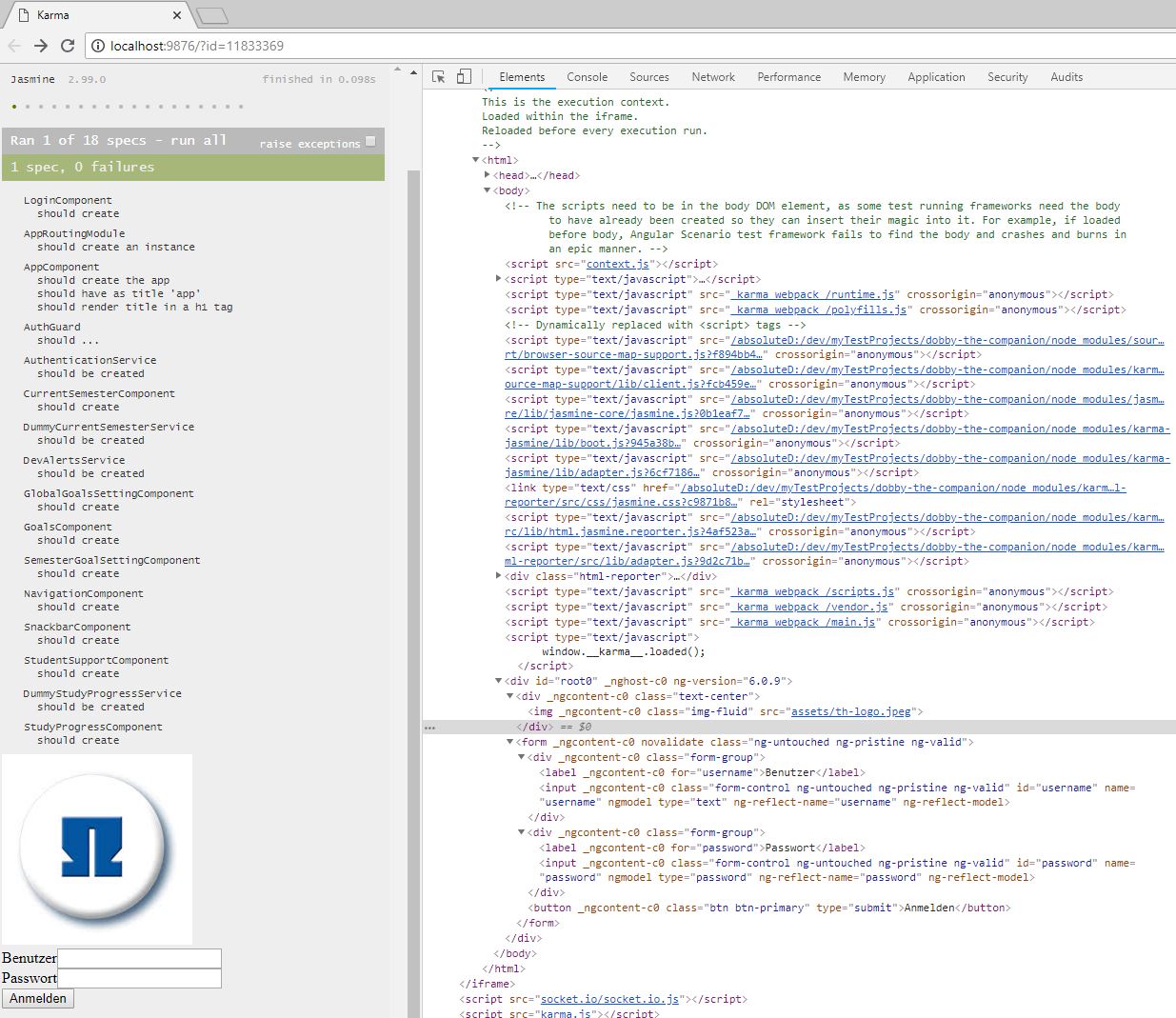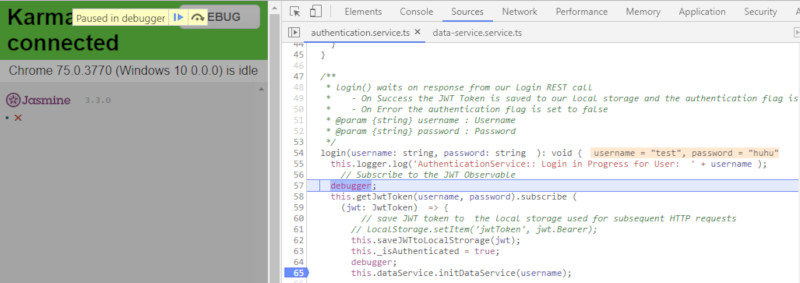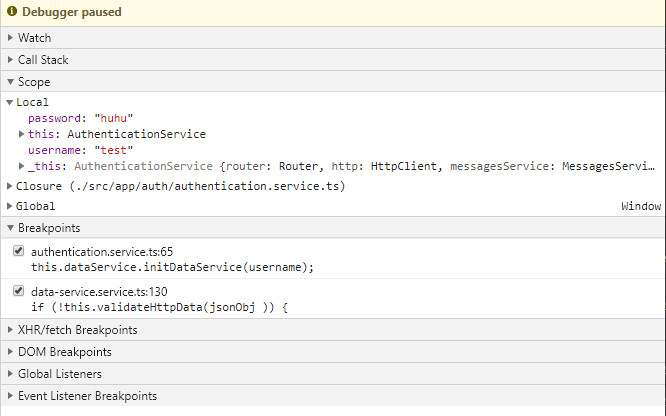×
Karma Installation
Install Karma Client on Windows 10 an run it from Command Line
D:\dev\myTestProjects\dobby-the-companion> npm install -g karma-cli C:\Users\Helmut\AppData\Roaming\npm\karma -> C:\Users\Helmut\AppData\Roaming\npm\node_modules\karma-cli\bin\karma + karma-cli@1.0.1 updated 1 package in 0.421s D:\dev\myTestProjects\dobby-the-companion> karma start 08 08 2018 16:03:24.227:WARN [karma]: No captured browser, open http://localhost:9876/ 08 08 2018 16:03:24.232:WARN [karma]: Port 9876 in use 08 08 2018 16:03:24.233:INFO [karma]: Karma v1.7.1 server started at http://0.0.0.0:9877/
Run all Karma test
D:\dev\myTestProjects\dobby-the-companion> ng test 10% building modules 1/1 modules 0 active(node:25148) DeprecationWarning: Tapable.plugin is deprecated. Use new API on `.hooks` instead 10 08 2018 14:07:37.807:WARN [karma]: No captured browser, open http://localhost:9876/ 10 08 2018 14:07:37.813:INFO [karma]: Karma v1.7.1 server started at http://0.0.0.0:9876/ 10 08 2018 14:07:37.813:INFO [launcher]: Launching browser Chrome with unlimited concurrency 10 08 2018 14:07:37.817:INFO [launcher]: Starting browser Chrome 10 08 2018 14:07:43.581:WARN [karma]: No captured browser, open http://localhost:9876/
Missing Error Messages with Angular / Karma testing – add source-map=false parameter
D:\dev\myTestProjects\dobby-the-companion> ng test --source-map=false 10% building modules 1/1 modules 0 active(node:6332) DeprecationWarning: Tapable.plugin is deprecated. Use new API on `.hooks` instead 10 08 2018 14:24:47.487:WARN [karma]: No captured browser, open http://localhost:9876/ 10 08 2018 14:24:47.492:INFO [karma]: Karma v1.7.1 server started at http://0.0.0.0:9876/ 10 08 2018 14:24:47.492:INFO [launcher]: Launching browser Chrome with unlimited concurrency 10 08 2018 14:24:47.504:INFO [launcher]: Starting browser Chrome 10 08 2018 14:24:50.370:WARN [karma]: No captured browser, open http://localhost:9876/ 10 08 2018 14:24:50.748:INFO [Chrome 67.0.3396 (Windows 10.0.0)]: Connected on socket Ml0r-gsA3JNw1F0sAAAA with id 52984303
Run ONLY a single Karma test
Change in your IDE :
describe('LoginComponent', () => {
-> fdescribe('LoginComponent', () => {
Reference
Using RouterTestingModule to test Angular Router Object
Code to be tested
import {Router} from '@angular/router';
export class myComponent {
constructor( private router: Router ) { }
triggerMessageAction(m: Message) {
if (m.messageClass === 'internal') {
this.router.navigate([m.messageLink]);
}
}
Karma/Jasmine Test Code
import {RouterTestingModule} from '@angular/router/testing';
import {Router} from '@angular/router';
describe('WarningDialogComponent', () => {
beforeEach(async(() => {
TestBed.configureTestingModule({
...
imports: [ RouterTestingModule ],
}).compileComponents();
}));
beforeEach(inject([MessagesService], (service: MessagesService) => {
...
}));
it('should close Warning Dialog after pressing on a Warning Action ', inject([MessagesService, Router],
(service: MessagesService, router: Router) => {
spyOn(component, 'triggerMessageAction').and.callThrough();
spyOn(router, 'navigate').and.returnValue(true);
expect(component.triggerMessageAction).toHaveBeenCalledWith(jasmine.objectContaining( {messageType: 'logout'}));
expect(router.navigate).toHaveBeenCalledWith('login');
}));
});
Potential Error
Error:: Expected a spy, but got Function. Usage: expect( ).toHaveBeenCalledWith(...arguments) Fix: Add spyOn for the methode you want to spy spyOn(router, 'navigate').and.returnValue(true)
Using SpyOn to run UNIT-tests for Angular Router Calls
- spyOn() takes two parameters: the first parameter is the name of the object and the second parameter is the name of the method to be spied upon
- It replaces the spied method with a stub, and does not actually execute the real method
- The spyOn() function can however be called only on existing methods.
- A spy only exists in the describe or it block in which it is defined, and will be removed after each spec
Sample Code
it(`Fake Login with should set isAuthenticated Flag and finally call route: ects`,
async(inject([AuthenticationService, HttpTestingController],
(service: AuthenticationService, backend: HttpTestingController) => {
spyOn(service.router, 'navigate').and.returnValue(true);
service.login('Helmut', 'mySecret');
// Fake a HTTP response with a Bearer Token
// Ask the HTTP mock to return some fake data using the flush method:
backend.match({
method: 'POST'
})[0].flush({ Bearer: 'A Bearer Token: XXXXXXX' });
expect(service.router.navigate).toHaveBeenCalled();
expect(service.router.navigate).toHaveBeenCalledWith(['ects']);
expect(service.isAuthenticated()).toEqual(true);
})));
Reference
My Fist Karma Sample
| Screenshot Chrome Browser after running Tests | Details |
|---|---|
 |
|
| Html Code | Type Script TestCode: login.components.spec.ts |
|---|---|
|
|
|
Debug Karma Test
- Add debugger keyword to your Java Script Code you want to debug
- Start Karma tests with : ng test
- Add Chrome Debugger Tools by pressing F12
- Reload your page – Javascript code should stop on the line with debugger statement
| Screenshot Chrome Browser after running Tests | Details |
|---|---|
 |
 |
A more complexer Sample setting up a Karma Test Environment for Integration Tests
import { async, ComponentFixture, TestBed } from '@angular/core/testing';
import { CurrentSemesterComponent } from './current-semester.component';
import { CommonHeaderComponent } from '../common-header/common-header.component';
import { NavigationComponent } from '../navigation/navigation.component';
import { RouterTestingModule } from '@angular/router/testing';
import { MatIconModule } from '@angular/material';
import {MatButtonToggleModule} from '@angular/material/button-toggle';
import {AuthenticationService} from '../auth/authentication.service';
fdescribe('CurrentSemesterComponent', () => {
let component: CurrentSemesterComponent;
let fixture: ComponentFixture;
beforeEach(async(() => {
TestBed.configureTestingModule({
declarations: [ CurrentSemesterComponent,CommonHeaderComponent, NavigationComponent ],
providers: [AuthenticationService,],
imports: [RouterTestingModule, MatIconModule, MatButtonToggleModule ],
})
.compileComponents();
}));
beforeEach(() => {
fixture = TestBed.createComponent(CurrentSemesterComponent);
component = fixture.componentInstance;
fixture.detectChanges();
});
it('should create', () => {
expect(component).toBeTruthy();
});
});
Jasmine Test Order
- Currently (v2.x) Jasmine runs tests in the order they are defined
- However, there is a new (Oct 2015) option to run specs in a random order, which is still off by default
- According to the project owner, in Jasmine 3.x it will be converted to be the default.
Reference
Jasmine and Timeout
Reference
https://makandracards.com/makandra/32477-testing-settimeout-and-setinterval-with-jasmine
Error: router-outlet’ is not a known element:
Error Details
'router-outlet' is not a known element: 1. If 'router-outlet' is an Angular component, then verify that it is part of this module. 2. If 'router-outlet' is a Web Component then add 'CUSTOM_ELEMENTS_SCHEMA' to the '@NgModule.schemas' of this component to suppress this message."<app-navigation></app-navigation> <div class="container"> [ERROR ->]<router-outlet></router-outlet> </div> "): ng:///DynamicTestModule/AppComponent.html@2:2
Fix – import RouterTestingModule
import {RouterTestingModule} from '@angular/router/testing'
describe('AppComponent', () => {
beforeEach(async(() => {
TestBed.configureTestingModule({
declarations: [
AppComponent
],
imports: [ RouterTestingModule ]
}).compileComponents();
}));
Reference
Error: app-navigation’ is not a known element:
Error Details
AppComponent should create the app
Failed: Template parse errors:
'app-navigation' is not a known element:
1. If 'app-navigation' is an Angular component, then verify that it is part of this module.
2. If 'app-navigation' is a Web Component then add 'CUSTOM_ELEMENTS_SCHEMA' to the '@NgModule.schemas' of this component to suppress this message. ("
<title>app</title>
[ERROR ->]<app-navigation></app-navigation>
Angular code
app.component.html<app-navigation></app-navigation> <div class="container"> <router-outlet></router-outlet> </div> navigation.component.ts import {Component, OnInit} from '@angular/core'; import {AuthenticationService} from '../auth/authentication.service'; @Component({ selector: 'app-navigation', templateUrl: './navigation.component.html', styleUrls: ['./navigation.component.css'] }) ...
Fix – Add a stubbing Object
import { TestBed, async } from '@angular/core/testing';
import { AppComponent } from './app.component';
import {RouterTestingModule} from '@angular/router/testing'
import {Component} from '@angular/core';
@Component({selector: 'app-navigation', template: ''})
class NavigationStubComponent {}
describe('AppComponent', () => {
beforeEach(async(() => {
TestBed.configureTestingModule({
declarations: [
AppComponent,
NavigationStubComponent
],
imports: [ RouterTestingModule ]
}).compileComponents();
})
Reference
Error Injecting a service
Error Datails: NullInjectorError: No provider for AuthenticationService!
NavigationComponent should create
Error: StaticInjectorError(DynamicTestModule)[NavigationComponent -> AuthenticationService]:
StaticInjectorError(Platform: core)[NavigationComponent -> AuthenticationService]:
NullInjectorError: No provider for AuthenticationService!
Fix add AuthenticationService to the provider Array
import {AuthenticationService} from '../auth/authentication.service';
describe('NavigationComponent', () => {
let component: NavigationComponent;
let fixture: ComponentFixture;
beforeEach(async(() => {
TestBed.configureTestingModule({
declarations: [ NavigationComponent ],
providers: [
MatSnackBar,
Overlay,
AuthenticationService,
SnackBarComponent,
DatePipe],
})
.compileComponents();
}));
Error: Failed: Template parse errors
Error Datails: There is no directive with “exportAs” set to “ngForm”
LoginComponent should create
Failed: Template parse errors:
There is no directive with "exportAs" set to "ngForm" ("
<form (ngSubmit)="onLogin(f)" [ERROR ->]#f="ngForm">
<div class="form-group">
<label for="username">Benutzer</label>
"): ng:///DynamicTestModule/LoginComponent.html@5:30
Fix: Add FormsModule Import
describe('LoginComponent', () => {
let component: LoginComponent;
let fixture: ComponentFixture;
beforeEach(async(() => {
TestBed.configureTestingModule({
declarations: [ LoginComponent ],
imports: [FormsModule ],
providers: [AuthenticationService]
})
Reference
Error: StaticInjectorError(DynamicTestModule)[AuthGuard -> Router]:
Error Datails: NullInjectorError: No provider for Router!
Error: StaticInjectorError(DynamicTestModule)[AuthGuard -> Router]:
StaticInjectorError(Platform: core)[AuthGuard -> Router]:
NullInjectorError: No provider for Router!
Error: StaticInjectorError(DynamicTestModule)[AuthGuard -> Router]:
StaticInjectorError(Platform: core)[AuthGuard -> Router]:
NullInjectorError: No provider for Router
Fix: Add RouterTesting Module
import { TestBed, async, inject } from '@angular/core/testing';
import { AuthGuard } from './auth-guard.service';
import {AuthenticationService} from '../auth/authentication.service';
import {RouterTestingModule} from '@angular/router/testing';
describe('AuthGuard', () => {
beforeEach(() => {
TestBed.configureTestingModule({
providers: [AuthGuard,
AuthenticationService,
],
imports: [
RouterTestingModule
],
});
});
Setup for NGXLogger
Note: the setup below should use a single logger instance for both : Code Base and for Karma/Jasmine Tests!
import { TestBed, inject } from '@angular/core/testing';
import {LoggerConfig, LoggerTestingModule, NGXLogger} from 'ngx-logger';
fdescribe('InterceptService', () => {
beforeEach(() => {
TestBed.configureTestingModule({
imports: [
LoggerTestingModule
],
providers: [ NGXLogger, LoggerConfig,
... ]
});
});
fit(' should create and test NGXLogger !',
inject([NGXLogger], (logger: NGXLogger) => {
// config the Logger
logger.updateConfig({ level: NgxLoggerLevel.DEBUG });
// send a Test message from our Karma Code to the
logger.log('Logger Message from Karma Testing Module !');
// Override the logger instance from our production code
component.logger = logger;
// Invoke a function to test NGXLogger functionality works for our Code Base too !
component.syncSemsterData();
expect(component).toBeTruthy();
}));
});
Logger Output :
2019-08-13T11:37:46.298Z LOG [semester-goal-setting.component.spec.ts:95] Logger Message from Karma Testing Module !
2019-08-13T11:37:46.743Z LOG [semester-goal-setting.component.ts:130] syncSemsterData():: Subjects: 3 - all Marks Valid : true - saveButtonIsDisabled false
A complexer Sample mocking Services and Components
@Component({selector: 'app-semester-header', template: ''})
class SemesterHeaderStubComponent {}
@Component({selector: 'app-navigation', template: ''})
class NavigationStubComponent {}
export class MockDataService {
public isReady = true;
getIsReady(): boolean {
return this.isReady;
}
setAppStatusFailed(): void {}
getSemesterById(): Semester {
return new Semester(1, 20, 30 , false, true,
[ new Module('Mathematik', 8, 2.2, 2.0, 3.0, true),
new Module('JAVA Programming 2', 7, 2.2, 2.0, 3.0, true),
]);
}
}
describe('CurrentSemesterComponent', () => {
let component: CurrentSemesterComponent;
let fixture: ComponentFixture;
beforeEach(() => {
TestBed.configureTestingModule({
declarations: [ CurrentSemesterComponent, SemesterHeaderStubComponent, NavigationStubComponent],
imports: [
LoggerTestingModule,
RouterTestingModule,
NoopAnimationsModule
],
schemas: [NO_ERRORS_SCHEMA],
providers: [
NGXLogger,
LoggerConfig,
{provide: DataService, useValue: new MockDataService() } ]
});
fixture = TestBed.createComponent(CurrentSemesterComponent);
component = fixture.componentInstance;
fixture.detectChanges();
});
it('should create', () => {
expect(component).toBeTruthy();
});
/*
Whenever dataService is not ready setAppStatusFailed() should be called with systemError param
*/
it('if dataService not READY setAppStatusFailed() should be called with param \'systemError\' ', () => {
let dataService: MockDataService;
dataService = TestBed.get(DataService);
const spy = spyOn(dataService, 'setAppStatusFailed');
dataService.isReady = false;
component.ngOnInit();
expect(component).toBeTruthy();
expect(dataService.setAppStatusFailed).toHaveBeenCalledWith('systemError');
});
/*
Whenever dataService is READY setAppStatusFailed() should NOT be called anyway
*/
it('if dataService is READY setAppStatusFailed() should not have been called', () => {
let dataService: MockDataService;
dataService = TestBed.get(DataService);
const spy = spyOn(dataService, 'setAppStatusFailed');
dataService.isReady = true;
component.ngOnInit();
expect(component).toBeTruthy();
expect(dataService.setAppStatusFailed).not.toHaveBeenCalled();
});
});
Mock a Service Object
export class MockDataService {
public isReady = true;
getSemesterById(semId: number): Semester {
return new Semester( '20192' , 30, 0, '', 0,
[
new Mark( 4.5, 5, new Exam ( '6', 'Mathematik S1'), 3, true ),
new Mark( 2.5, 7, new Exam ( '5', 'JAVA Programming II S1'), 2, true ),
new Mark( 1.5, 8, new Exam ( '4', 'C ++ Programming II S1'), 2.7, true ),
])
}
}
fdescribe('SemesterGoalSettingComponent', () => {
let component: SemesterGoalSettingComponent;
let fixture: ComponentFixture;
beforeEach(async(() => {
TestBed.configureTestingModule({
declarations: [ SemesterGoalSettingComponent ],
schemas: [NO_ERRORS_SCHEMA],
imports: [ MatTableModule, MatDialogModule, RouterTestingModule, LoggerTestingModule , HttpClientModule,
HttpClientTestingModule, MatSnackBarModule],
providers: [ NGXLogger, LoggerConfig, MatSnackBar, MatDialog,
{ provide: DataService, useValue: new MockDataService() } ]
})
.compileComponents();
}));
...
Simulate a Button Press Action
Karma/Jasmine Test Code:
beforeEach(() => {
fixture = TestBed.createComponent(SemesterHeaderComponent);
component = fixture.componentInstance;
// 'autoDetectChanges' will continually check for changes until the test is complete.
// This is slower, but necessary for certain UI changes as changes triggered by ngFor Ops
fixture.autoDetectChanges(true);
});
it('Button Press should redirect to Central ECTS Page ', () => {
spyOn(component, 'navigateTop');
const el1 = fixture.debugElement.query(By.css('#return-to-top-level-page')).nativeElement;
el1.click();
expect(component.navigateTop).toHaveBeenCalled();
});
HTML Code:
<button id="return-to-top-level-page" class="mat-button-study-progress" mat-button (click)="navigateTop()" > <mat-icon class="button-navigate-back color_white" >arrow_back_ios</mat-icon> </button>
JavaScript Code:
navigateTop() {
this.logger.warn('SemesterHeaderComponent::navigate to ECTS Page !: ');
this.router.navigate(['ects']);
}